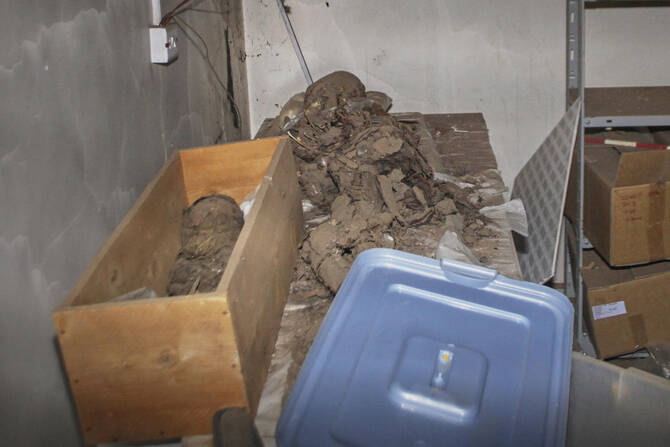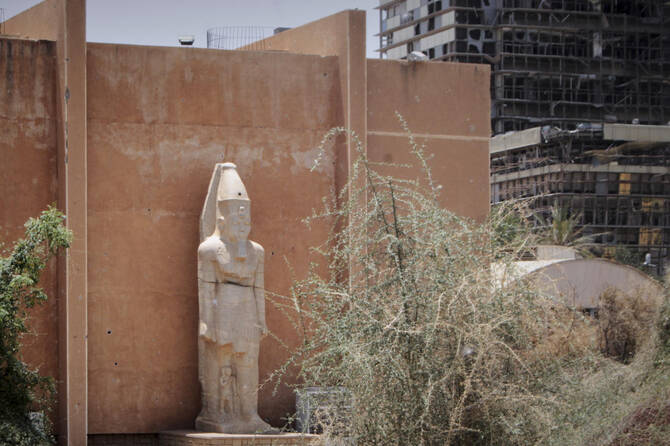CAIRO: Inside Sudan’s biggest museum, the exhibition halls once filled with statues and relics from centuries of ancient civilizations are trashed, littered with debris. The display cases stand empty and shattered. A mummy lies exposed in an open storage box. All the gold artifacts have been looted.
The Sudan National Museum has been wrecked by two years of war in Sudan, with most of its artifacts stolen. Authorities blame the paramilitary Rapid Support Forces, which held this district of Khartoum along the banks of the Nile River for most of the conflict.
Since the Sudanese military regained control of the capital last month, officials have been working to assess the damage and loss in hopes of one day restoring the museum.
“The losses are extremely big and saddening. A significant number of antiquities were stolen,” Gamal ElDeen Zain Al-Abdeen, a senior official at the National Corporation for Antiquities and Museums, told The Associated Press. “The RSF destroyed everything ... concerning the civilization of the Sudanese people.”
The National Museum had thousands of pieces, dating back to the Paleolithic era well before the development of agriculture, and through the kingdoms of ancient Sudan. Many came from the Napatan era in the eighth and seventh centuries B.C., when pharaohs from Sudan ruled over much of ancient Egypt, or from the later Meroitic kingdom that built pyramids in Sudan. Other halls had later Christian and Islamic material.
Some pieces too heavy to carry remain in place. In the museum’s garden, a line of stone lions remains, as do the Colossi of Tabo, two large pharaonic-style statues. Also remaining are three pharaonic temples that were moved from northern Sudan and reassembled at the museum in the 1960s to escape the rising waters of Lake Nasser from Egypt’s construction of the High Dam.
But many objects are gone. Looters broke into the locked storerooms and made off with all the gold artifacts, Zain Al-Abdeen said. But it was too early to know how much of the museum’s collection had been stolen, he said.
Museums paid a heavy price in the war
He blamed the RSF for the destruction, saying they had fighters in the museum at some point during the war.
The war in Sudan broke out in April 2023, after tensions between the Sudanese army and the rival RSF turned into battles in the streets of Khartoum and rapidly spread around the country. The RSF held much of Khartoum during the war, including the district of the museum.
Now that they have been driven out, the extent of the destruction from fighting and looting is coming clear.
“Khartoum in general has been destroyed, particularly the center of Khartoum,” Zain Al-Abdeen said. “No building was spared from the bloodshed and theft, and this is what I saw with my own eyes.” He said all the city’s museums were damaged, particularly the Ethnography Museum, where walls were demolished and halls and offices burned.
The ransacking is a blow to a country with a rich heritage, one that has deep resonance among Sudanese but is often overlooked abroad because of Sudan’s decades of instability.
‘Erasing history’
UNESCO said in September it was concerned about looting at the Sudan National Museum, which it helped renovate in 2019. It warned that sale or removal of artifacts “would result in the disappearance of part of the Sudanese cultural identity and jeopardize the country’s recovery.”
A UNESCO spokesperson said Friday that damage, looting and destruction of museums and cultural sites happened across Sudan’s states of Khartoum, River Nile, Northern State, Gezeira and the Darfur region. An accurate assessment isn’t possible due to the ongoing fighting.
The Sudan National Museum is among several that have undergone “extensive looting and substantial damage,” according to UNESCO.
Sedeeq Mohamed Sedeeq, who lives near the museum, said the RSF vowed democracy and liberation but instead they are “erasing the oldest nation in history, erasing its history.”
Reconstruction plans for destroyed museums will begin after committees assess the damage and recommend proposals for rehabilitation, Zein Al-Abdeen said. The plans are expected to include building repairs, restoration of the antiquities storage areas and fixing the museum’s surrounding grounds.
At least 20,000 people have been killed since the war broke out, though the number is likely far higher. The war has also driven more than 14 million people from their homes and pushed parts of the country into famine.






























